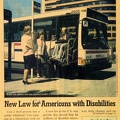Rocky Mountain News 9/8/89
[Headline] Senate OKs disabled-rights bill
[Subheading] Access to jobs, transit, eateries guaranteed for AIDS victims, too
WASHINGTON (AP) — The Senate voted 76-8 last night to approve legislation to guarantee 43 million disabled Americans — including most AIDS victims —- rights to employment, transportation and the use of restaurants and other businesses.
Lawmakers debated the bill with sign-language interpreters allowed on the Senate floor for the first time in the institution’s history to make the proceedings available to deaf audiences watching in the galleries and on television.
Supporters likened the Americans With Disabilities Act to the Civil Rights Act 25 years ago that guaranteed blacks and other minorities their right to participate fully in American society.
The act is “a 20th century Emancipation Proclamation for people with disabilities,” said Sen. Tom Harkin, D-Iowa, the bill's chief sponsor. Fifty-nine senators of both parties added their names to the legislation. An amendment made Congress subject to the law.
“The Americans with Disabilities Act is a landmark statement of basic human rights that will make the promise of equal opportunity a reality. for 43 million Americans with disabilities,” said Harkin.
Sen. Jesse Helms, R-N.C., had challenged a definition of disabled that includes people with the AIDS virus, saying 85% are homosexuals or drug users.
“This bill responds to those 15% who are not," said Harkin, who also quoted the health and human services Secretary, Dr. Louis Sullivan, as saying there is no medical reason for discrimination against AIDS sufferers.
The legislation prohibits employment discrimination by businesses with 15 or more employees, although the limit would be 25 employees for the first two years. All privately owned stores, restaurants and other businesses would be prohibited from discrimination.
All new buses would have to be made accessible.
Area lawmakers voting against the measure were William Armstrong, R-Colo., Malcolm Wallop, R-Wyo., and Jake Garn, R-Utah.
- Created on
- Friday 12 July 2013
- Posted on
- Wednesday 22 July 2015
- Tags
- 43 million, ADA, AIDS, Civil Rights Act of 1964, disabled, discrimination, Senate, Senator Jesse Helms, Senator Tom Harkin
- Albums
- Visits
- 1868
- Rating score
- no rate
- Rate this photo


0 comments